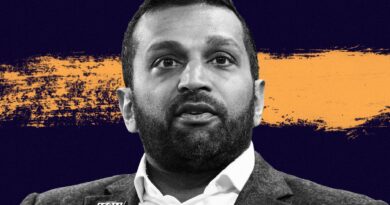A Biden Victory Isn’t a Defeat for QAnon
Marjorie Taylor Greene, a Republican from Georgia who has repeatedly expressed belief in the QAnon conspiracy theory, was elected to the House of Representatives Tuesday night. Lauren Boebert, a Republican from Colorado who has said that she hopes QAnon is real because “it only means America is getting stronger and better,” won her contest too. Come January, almost a million and a half Americans will be represented in Congress by people who support a community bent on proving that President Donald Trump is waging a holy war against a high-powered cabal of child traffickers and blood-drinking Satanists that includes prominent Democratic politicians and Hollywood celebrities. This worldview is vehemently anti-media, anti-science, and—despite its claims of patriotism—antidemocratic, because it often calls for Trump to lead a military coup against the “deep state,” and to execute political enemies and “child-killers.” The FBI has deemed QAnon a domestic-terrorism threat. Trump refused to denounce it throughout his reelection campaign.
Earlier this year—before Greene’s and Boebert’s victories; before baseless theories about child trafficking spread across the internet, possibly permanently damaging the standing of a furniture company that has never been found guilty of wrongdoing; before QAnon led rallies in dozens of cities—it might have been easy to imagine that the end of Trump’s presidency would spell the end of QAnon. But QAnon is bigger than Trump, and with a robust conspiracy theory, there’s never a crisp end. In a worldview dominated by the belief that Democratic elites have rigged the system, a Biden victory wouldn’t be a repudiation—it would be further evidence of a scandal. And the longer, closer, and more drawn-out vote-counting is, the more baroque the theories can become.
Throughout Election Day, Q, the anonymous forum poster whose cryptic messages are the basis for the conspiracy theory, was notably silent, and the community’s narrative was muddy and fluid. First the deep state was going to shut down the internet for 10 days so that nobody would know how mightily Trump had trounced Biden; then it was going to do the same thing, but so that nobody could talk about how brazenly the election had been stolen from him. As misinformation about the state of the election in Pennsylvania swirled online, QAnon supporters suggested that Trump was focusing “the world[’s] eyes” there because it is a deep-state “stronghold.” On Instagram, QAnon-adjacent lifestyle influencers were anxious and praying for the president, but celebrating the return of a major QAnon Instagram figure known as Little Miss Patriot, who has been banned several times and continues to make new accounts that quickly rack up thousands of followers. Known for rendering conspiracy theories in colorful fonts over pretty pastel backgrounds, she was back under a new name, asking fans to tag her if they were wearing Little Miss Patriot merch. (After an inquiry from The Atlantic, Instagram deleted the account.)
But by yesterday, QAnon fans across platforms had managed to agree that Biden was attempting to illegally steal the election—an idea, based on no evidence, that was being promoted on Twitter by prominent right-wing figures, including the president and his son Donald Trump Jr. Once Trump settled on this narrative, QAnon supporters appeared energized and focused. The new Little Miss Patriot, who had at first observed the election coolly and straightforwardly—announcing when states were called for Trump, confessing that she’d gotten nervous about Texas for a minute—was suddenly making promises and expressing confidence. “We knew the left was going to do everything they could to delay this,” she wrote before her account was deleted. “Trump won & they’re trying to rely on fraudulent mail in ballots. it’s not going to work. Trump knew they were going to do this, too. he is prepared.”
“This is the part of the movie where voter fraud and the media’s role in perpetuating that fraud, which has been going on for decades, now becomes crystal clear to everyone who is paying attention,” another QAnon supporter posted on Instagram. Major Instagram accounts urged their followers to “trust the plan [and enjoy] the show,” and reminded them that “PATRIOTS ARE IN CONTROL.” On Twitter, sentiment shifted similarly. “Trust Trump. He knew this was coming. He said so for months,” one supporter tweeted. “In the coming days the REAL Patriots will be identified,” wrote another. “Fight and win or die fighting.” Greene, the representative-elect from Georgia, tweeted asking her followers to stop Democrats from “stealing” the election 15 times from midnight to 2 p.m. yesterday, though most of these tweets were quickly covered by a label warning that “some or all of the content shared in this Tweet is disputed and might be misleading about an election.”
An American presidential election that may go unresolved for days or longer is a new and bizarre emotional experience for many of us. It is also, in its unprecedented, prolonged uncertainty, the ideal environment for conspiracy thinking to take hold. Many social platforms—including Facebook, Twitter, TikTok, and Instagram—made serious progress over the summer to mitigate QAnon’s spread online. But that’s no longer the extent of the issue. According to a recent assessment by Media Matters, 97 current or former congressional candidates have embraced QAnon—including 27 who were on the ballot for the general election on Tuesday. Two are going to Congress. More supporters may end up in state legislatures. No amount of time is too much to wait for Trump to reveal his master plan. “Among the people of QAnon, faith remains absolute,” my colleague Adrienne LaFrance wrote in June. “They are certain that a Great Awakening is coming. They’ll wait as long as they must for deliverance.”
QAnon is not just on the internet anymore; it’s in the U.S. Capitol. It is not just a conspiracy theory anymore; it’s a voting bloc. And it is not going anywhere.
We want to hear what you think about this article. Submit a letter to the editor or write to letters@theatlantic.com.
*** This article has been archived for your research. The original version from The Atlantic can be found here ***



